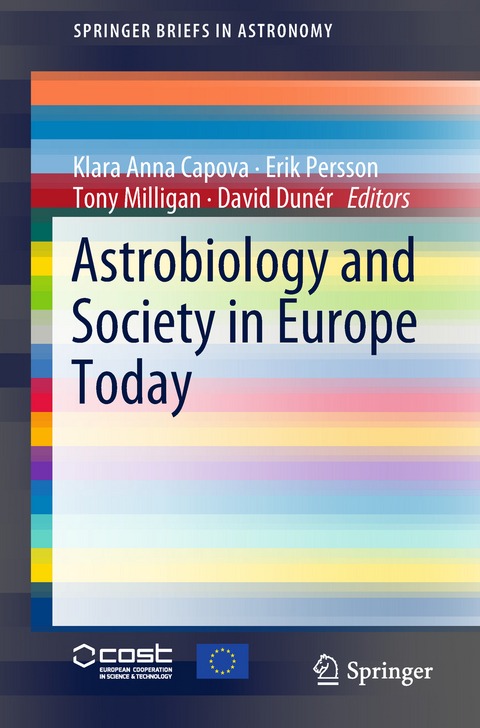
Astrobiology and Society in Europe Today
Springer International Publishing (Verlag)
978-3-319-96264-1 (ISBN)
This White Paper describes the state of astrobiology in Europe today and its relation to the European society at large. With contributions from authors in twenty countries and over thirty scientific institutions worldwide, the document illustrates the societal implications of astrobiology and the positive contribution that astrobiology can make to European society.
The White paper has two main objectives: 1. It recommends the establishment of a European Astrobiology Institute (EAI) as an answer to a series of challenges relating to astrobiology but also European research, education and the society at large. 2. It also acknowledges the societal implications of astrobiology, and thus the role of the social sciences and humanities in optimizing the positive contribution that astrobiology can make to the lives of the people of Europe and the challenges they face.
This book is recommended reading for science policy makers, the interested public, and the astrobiologycommunity.Dr Klara Anna Capova is an anthropologist working in science and technology studies, specialising in the social study of astrobiology and anthropology of outer space. In 2013, she completed her doctoral research on scientific search for life beyond earth, Durham University, UK. Her recent work includes the study of transformations of human relations to outer space, popular perceptions of science, and societal context of space exploration. Dr Capova is currently a honorary research associate at Durham University, UK. Klara is a member of the WG5 on Philosophy and History of Science, of the COST Action TD1308 ORIGINS and evolution of life on Earth and in the Universe; a member of the European Astrobiology Network Association, Astrobiology Society of Britain and a member of the Scientific Organizing Committee of the International Working Group on Astrobioethics. She is active in delivering talks worldwide as well as acts as an associate researcher and project consultant in societal aspects of space and society, and science and technology.Dr Erik Persson received his PhD in Practical Philosophy from Lund University, where he is now working as a reseracher at the Department of Philosophy. He has also worked as researcher at the Swedish University for Agricultural Sciences, as researcher and Principal Investigator at the Pufendorf Institute of Advanced Studies, as Research Fellow at the Center of Theological Inquiry in Princeton, as Senior Scientist at The Nordic Genetic Resource Center, and as Senior Lecturer at Umeå University. His research is primarily focused on applied ethics, especially, environmental ethics, space ethics and ethical aspects of emerging technologies.Dr Tony Milligan is the author of a series of books including Nobody Owns the Moon: The Ethics of Space Exploitation (2015), as well as a co-editor of various volumes, including The Ethics of Space Exploration (2016). He is a Teaching Fellow in Ethics and the Philosophy of Religion at King’s College London.David Dunér is professor of history of science and ideas at Lund University, Sweden. He is also a researcher at the division for cognitive semiotics at Lund University. He was the leader of working group 5 on the history and philosophy of astrobiology within the COST Action TD 1308, Origins and Evolution of Life on Earth and in the Universe. He has edited the book The History and Philosophy of Astrobiology: Perspectives on Extraterrestrial Life and the Human Mind (Cambridge Scholars: Newcastle-upon-Tyne, 2013) and special issues on the history and philosophy of astrobiology in Astrobiology (2012), and on the history and philosophy of the origin of life in International Journal of Astrobiology (2016).
1. Introduction.- 2. Astrobiology and Society in Europe.- 3. The International Context of Astrobiology.- 4. Society, Worldview and Outreach.- 5. Environment and Sustainability.- 6. Education, Training and Scholarship.- 7. Technological Innovation and Commerce.- 8. Science and Research.- 9. Leading the Future of Astrobiology in Europe.- 10. Appendices.
| Erscheinungsdatum | 18.08.2018 |
|---|---|
| Reihe/Serie | SpringerBriefs in Astronomy |
| Zusatzinfo | XVI, 72 p. 14 illus., 13 illus. in color. |
| Verlagsort | Cham |
| Sprache | englisch |
| Maße | 155 x 235 mm |
| Gewicht | 149 g |
| Themenwelt | Sachbuch/Ratgeber |
| Naturwissenschaften ► Physik / Astronomie ► Astronomie / Astrophysik | |
| Schlagworte | Astrobiology in Europe • Ecological Sustainability • European Astrobiology Institute • Habitable planets, Exoplanets • Life origins • Research policy • Science innovation • Societal implications of astrobiology • Space humanities • space policy |
| ISBN-10 | 3-319-96264-7 / 3319962647 |
| ISBN-13 | 978-3-319-96264-1 / 9783319962641 |
| Zustand | Neuware |
| Haben Sie eine Frage zum Produkt? |
aus dem Bereich


